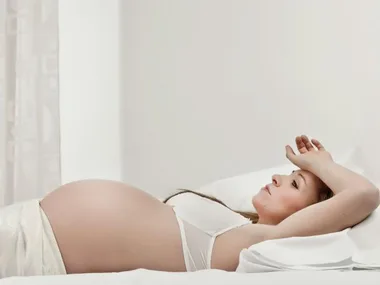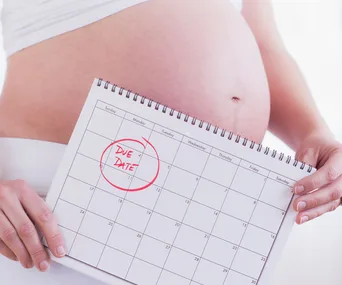Your body
It’s downhill all the way from now as you start your third and final trimester! Since that crucial moment some 27 weeks ago, when your partner’s sperm entered your egg, your body has been nurturing the zygote (two cells) that grew into an embryo that grew into a foetus and is now a thriving baby.
Back to the bathroom
After a brief respite for the past three months or so, your growing baby is probably pressing on your bladder again, making frequent trips to the loo a necessity. Go as soon as you feel the urge, because holding on can make you susceptible to urinary tract infections.
Too big for your boots?
One of the more curious side effects of your first pregnancy is that you may find your shoe size increases by half a size or so. While this is all well and good if you were blessed with petite size fours, if you’re already sporting size eights, you might be a little less thrilled. But at least they tend to shrink back after the birth!
Stretch marks
If you’ve been religiously oiling your stomach, thighs and breasts in the hope of preventing stretch marks – red streaks caused by the skin being pulled out of shape – you’ll soon be able to see whether all that effort has paid off. Doubtless, your skin will be smoother and smell divine as a result of your endeavours, but many experts believe stretch marks are hereditary and can’t be avoided. However, you can do some damage limitation on your breasts by wearing a good support bra. Fortunately, stretch marks do fade to silvery white lines in time.
Are you in labour?
Although your baby shouldn’t arrive for a good few weeks, it’s reassuring to know what to expect when you go into labour…
Diarrhoea and/or vomiting
Nesting, aka obsessive cleaning and tidying
A show
Your waters breaking
Lower back pain
Period-like pains that develop into what can only be contractions

Knowing what to expect when you go into labour can help put your mind at ease.
(Credit: Getty Images)Your baby
She weighs about 1.25kg and measures 26cm from crown to rump and 37cm in total. Her weight will double over the next 10 weeks and as she becomes fatter, she will become less mobile.
Lung power
Your baby’s lungs have been creating surfactant, a chemical needed for breathing. Over the next 10 weeks, her lungs will develop and mature until the moment when she takes her first breath, when around 25 million little air pockets (alveoli) will fill with air.
Looking after number one
Your placenta has done a remarkable job of sustaining your baby over the past months. During the last three months of pregnancy, this incredible organ also helps to prepare your baby for life outside the uterus, by transferring immunity against infections – in the form of antibodies – from you to your baby. As your due date approaches, the placenta also helps to set the time for birth.
Did you know?
The side of the placenta that lies next to your baby is smooth, whereas the part that’s attached to the uterus looks spongy.



